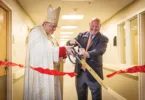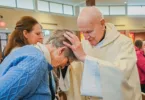by Jill Ragar Esfeld
jill.esfeld@theleaven.org
Every morning growing up, I woke to the sound of my father reciting the rosary in unison with a voice on a local radio station.
In college, when my faith was challenged by the “born again” Christian movement, I confronted him about prayer by rote. Why do Catholics do it — Our Fathers and Hail Marys over and over again? What’s the point?
His answer was simple but weighted with the wisdom of a man who had lived through the Depression, served in a war, and survived a Chinese prison camp.
“Sometimes,” he said, “it’s all you can do.”
He called it “keeping despair at the door” and warned me that “if you let despair in, hope goes out, and faith is soon to follow.”
In the years to come, I would learn that lesson well and be grateful for my rosary prayers and the 10 fingers God gave me to keep track of them.
Not only did they become an important method of meditation and centering as my prayer practice matured, but the rosary became an invaluable life tool — a way to get through those moments when, as my father said, it’s the only thing you can do.
A gift for our children
The immeasurable value of this prayer practice made me want to be sure, above all things, that my children learned the rosary. I saw it as the most important life tool my husband Jerry and I could give them.
But I wondered what would be the best method for teaching it. After all, the rosary can be a very long and tedious exercise in the hands of a five-year old. How could we present it as a gift and not a burden?
We decided to teach it in a manner most appealing to children, in bits and pieces, and with great appeal to their imaginations.
So each night, at prayer time, after our thank-you’s and petitions, my daughter Lizz and her little brother John would take turns choosing a rosary prayer to recite. And surprisingly, they chose the Apostles’ Creed as often as they chose the Glory Be. Length was never an issue; all prayers got equal practice.
I taught them to imagine Mary whispering their little concerns in Jesus’ ear and to think of her as their other mother — a mother who loves them as much as I do, but has far more power to make their dreams come true.
“When you call her name,” I said, “all the saints and angels turn and listen.”
In May and October, we would say a “car rosary” on the way to school, reciting a decade each morning, discussing the fruit of its mystery, and talking about how we could live that fruit during the day.
I showed them by example how important the rosary was to me. I said a rosary each day, asking them for prayer requests. Often they joined me for a decade or two. Every Wednesday, when they got out of Holy Trinity School in Lenexa, they knew they would find me in the adoration chapel saying a rosary.
A refuge and guide
The truth of my father’s wisdom was most clearly brought home to me, however, when John, in first grade, suffered from Kawasaki syndrome, a rare and life-threatening vasculitis.
At moments when I couldn’t think straight — when I sat helpless and watched a nurse struggle to get an IV in his small hand, when I waited for the results of yet another echocardiogram — the rosary helped me stay focused on Mary, who knew what it was like to watch a child suffer. Through her, I kept my eyes on God, never allowing despair to get its hold on me.
When John recovered from his illness, he worried that he might get sick again and had a hard time being away from me, especially at night. He would creep into my room and beg me to sit with him until he fell asleep.
I couldn’t refuse him. So I would sit on the edge of his bed, praying my rosary and begging Mary to show me the way to tough love.
Then one night an idea came to me, and the next day I bought a luminous rosary — one that glows in the dark. I gave it to John at bedtime and told him to say it all the way through before he came into my room.
“Try to stay awake,” I said. “But don’t worry if you fall asleep, because the angels will finish it for you.”
He never came into my room again, though many nights, before going to bed, we tore his covers apart looking for that rosary.
Our children’s keeper
Over the last 10 years, the angels have finished many rosaries for John, who is now in his last year of high school. His sister is a sophomore in college.
I’m happy to say my method of teaching them the rosary seems to have worked.
Lizz calls us now with weighty news about organic chemistry, biology internships and curriculum committee issues. When the going gets tough, she tells us, she says her rosary.
“I say the joyful mysteries,” she confides, “because those are the ones I know the best.”
I think that’s fine. I like to imagine her on her beautiful campus, in union with a youthful Mary, recalling the joys of Jesus’ life beginning.
As for me, I tend to gravitate toward the sorrowful mysteries these days. I draw strength from their fruits — courage, patience, perseverance. After all, we’re raising a teenage boy.
The child who, at seven, couldn’t leave my side, barely finds time to speak to me now as he races in the house just long enough to grab his golf clubs, a skateboard or a pair of basketball shoes. I can’t keep up with his girlfriends, much less his life.
And I worry every time he gets in the car and backs out of our driveway — a worry that borders on panic when he’s late, past his curfew.
But then I go up to his room to deliver a load of laundry or a school book that’s been left on the kitchen table, and I see his rosary — the same luminous one I gave him when he was seven.
Sometimes it’s in the middle of his unmade bed, or draped across the alarm clock on his night stand. I imagine him waking up and finding it wrapped around his hand just as it was when he fell asleep the night before, and a wave of comfort comes over me.
I know he’s talking to his other mother — the one who can make his dreams come true. And I know he’ll be OK, because she’s with him always, watching over him, keeping despair at the door.






